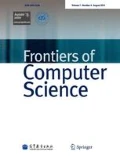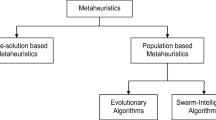Abstract
This paper proposes Adaptive Genetic Algorithms Guided by structural knowledges coming from decomposition methods, for solving PCSPs. The family of algorithms called AGAGD_x_y is designed to be doubly generic, meaning that any decomposition method and different heuristics for the genetic operators can be considered. To validate the approach, the decomposition algorithm due to Newman was used and several crossover operators based on structural knowledge such as the cluster, separator and the cut were tested. The experimental results obtained on the most challenging Minimum Interference-FAP problems of CALMA instances are very promising and lead to interesting perspectives to be explored in the future.
Similar content being viewed by others
References
Kochenberger G, Gloverand F, Alidaee B, Lewis K. Using the unconstrained quadratic program to model and solve max 2-sat problems. International Journal of Operational Research, 2005, 1(1): 89–100
Tate D M, Smith A E. A genetic approach to the quadratic assignment problem. Computers and Operations Research, 1995, 22(1): 73–83
Sadeg-Belkacem L, Habbas Z, Benbouzid-Sitayeb F, Singer D. Decomposition techniques for solving frequency assigment problems (fap) a top-down approach. In: Proceedings of International Conference on Agents and Artificial Intelligence. 2014, 477–484
Newman M E J. Fast algorithm for detecting community structure in networks. Physical Review, 2004, 69(6): 066133
Sadeg-Belkacem L, Habbas Z, Aggoune-Mtalaa W. AGAGD: an adaptive genetic algorithm guided by decomposition for solving PCSPs. In: Proceedings of International Conference on Agents and Artificial Intelligence. 2015
Freuder E, Wallace R. Partial constraint satisfaction. In: Proceedings of International Joint Conference on Artificial Intelligence. 1989, 278–283
Koster A, Van Hoesel S, Kolen A. The partial constraint satisfaction problem: facets and lifting theorems. Operations Research Letters, 1998, 23(3): 89–97
Koster A. Frequency assignment-models and algorithms. Dissertation for the Doctoral Degree. Maastricht: Maastricht University, 1999
Allouche D, Givry S, Schiex T. Towards parallel non serial dynamic programming for solving hard weighted CSP. Lecture Notes in Computer Science, 2010, 6308: 53–60
Colombo G, Allen SM. Problem decomposition for minimum interference frequency assignment. In: Proceedings of the IEEE Congress on Evolutionary Computation. 2007, 3492–3499
Loudni S, Boizumault P, Levasseur N. Advanced generic neighborhood heuristics for VNS. Engineering Applications of Artificial Intelligence, 2010, 23(5): 736–764
Loudni S, Fontaine M, Boizumault P. DGVNS guidée par les séparateurs. In: Proceedings of 9-èmes Journées Francophones de Programmation par Contrainte. 2013, 205–214
Koster A, Van Hoessel S, Kolen A. Solving partial constraint satisfaction problems with tree decomposition. Network Journal, 2002, 40(3): 170–180
Habbas Z, Martin S, Sadeg-Belkacem L, Singer D. Approche unifiée pour la décomposition et la résolution de pcsp: étude expérimentale sur fap. In: Proceedings of Journées Francophones de Programmation par Contraintes. 2013
Stoer M, Wagner F. A simple min-cut algorithm. Journal of the ACM, 1997, 44(4): 585–591
Koster A, Van Hoessel S, Kolen A. The partial constraint satisfaction problems: factes and lifting theorem. Operations Research Letters, 1998, 23(3–5): 89–97
Csardi G, Nepusz T. The igraph software package for complex network research. InterJournal, Complex Systems, 2006, 1695(5): 1–9
Author information
Authors and Affiliations
Corresponding author
Additional information
Lamia Sadeg-Belkacem received an engineering degree in computer science from Ecole Militaire Polytechnique, Algeria and an MS in computer science from Ecole nationale Supériere d’Informatique, Algeria. Her research interests include combinatorial optimization, metaheuristics, machine learning and graph theory.
Zineb Habbas obtained an engineering degree in computer science in 1979 and a magister in computer sciences in 1984 from the Université Scientifique et Technique Houari Boumediene, Algeria, a PhD in 1992 from the Institut National Polytechnique de Grenoble, France and an “Habilitation à Diriger des Recherches” from the Université de Metz, France in 2003. In 1992, she joined the IUT de Metz, France as a lecturer. From 2011 to date, she is a Professor at Université de Lorraine, France. Her research focuses on search and representation problems in Artificial Intelligence. She is interested in Constraint Satisfaction Problems and Optimization Problems, exact and non complete solving methods and parallel algorithmic. Recently she has been focusing on real applications like transportation problem, Electric Vehicle Routin Problems, Knowledge discovery, etc.
Wassila Aggoune-Mtalaa defended her PhD thesis in 2003 in computational mechanics from the University of Metz, France, after receiving a master thesis in applied mathematics in 2000. She joined Public Research Centre Henri Tudor, Luxembourg in 2008 as a post-doc researcher for RDI projects in operational research and industrial engineering. She works now as a researcher and project manager at Luxembourg Institute of Science and Technology, Luxembourg. Wassila Aggoune-Mtalaa has authored several scientific publications in refereed journals and conference proceedings and supervises several students in their work toward their master and PhD theses. Her main research interests are linked to optimization methods, simulation techniques and decision aiding for combinatorial problems.
Electronic supplementary material
Rights and permissions
About this article
Cite this article
Sadeg-Belkacem, L., Habbas, Z. & Aggoune-Mtalaa, W. Adaptive genetic algorithms guided by decomposition for PCSPs: application to frequency assignment problems. Front. Comput. Sci. 10, 1012–1025 (2016). https://doi.org/10.1007/s11704-016-4552-4
Received:
Accepted:
Published:
Issue Date:
DOI: https://doi.org/10.1007/s11704-016-4552-4




